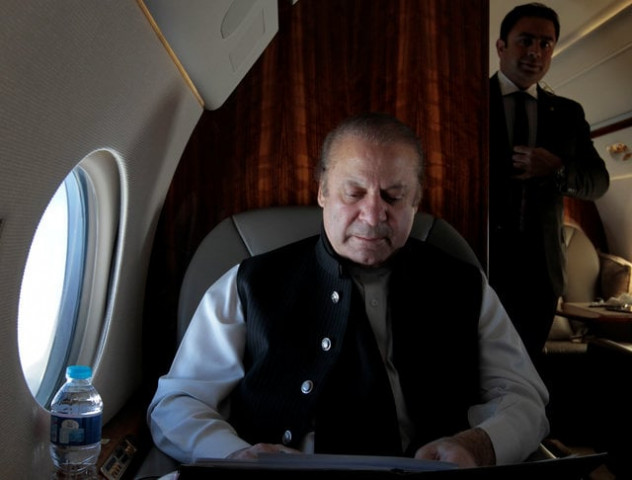Nawaz-Jindal meeting and secret diplomacy
Former diplomats say ‘back channel’ has always paved way for ending logjam in ties

Pakistani Prime Minister Nawaz Sharif works on his official plane as he travels to Karachi to inaugurate the M9 motorway between Hyderabad and Karachi, Pakistan February 3, 2017. REUTERS/Caren Firouz
Such was the furor around the meeting between Prime Minister Nawaz Sharif and Indian steel magnate Sajjan Jindal in Murree that the party of Imran Khan decided to take the issue to parliament.
The much discussed meeting was initially kept secret only to be acknowledged by Maryam Nawaz after media reports questioned the visit of a three-member Indian delegation to the populist tourist resort.
Details of Nawaz-Jindal 'secret' meeting must be made public: Khurshid Shah
Jindal’s name became known in Pakistan when he hosted Nawaz at his residence in New Delhi when the premier was visiting India to attend Prime Minister Narendra Modi’s swearing-in ceremony in May 2014.
At that time, no one had any idea that the Indian tycoon, who otherwise remained low profile, would become a key player in bringing the two prime ministers to the negotiating table.
Just few months after he hosted the Pakistani prime minister, Jindal was believed to have facilitated a secret meeting between Modi and Nawaz on the sidelines of the South Asian Association for Regional Cooperation (Saarc) summit in Nepal in Dec 1, 2015.
Jindal violated visa to meet Nawaz in Murree
He was also present in Lahore when Modi made a surprise stopover in the provincial capital on Dec 25, 2015. Against this backdrop, the meeting at Murree has attracted everyone’s attention.
Jindal’s visit has come at a point when the structured dialogue between Pakistan and India is suspended because of simmering tensions. So, was Jindal carrying a special message from Modi for Nawaz and was his visit part of efforts by the two sides to normalise ties?
No one knows the precise answer to all these queries but one thing is certain that Jindal’s visit was part of a back channel or unconventional diplomacy to defuse tensions.
PM in hot water over 'secret' meeting with Indian tycoon
His visit has come just weeks before the Shanghai Cooperation Organisation (SCO) summit in Kazakhstan where the prime ministers of rival states are expected to join other leaders from the member countries.
Therefore, one conjecture is that Jindal’s visit may be precursor to a bilateral meeting between Modi and Nawaz in Astana in June.
Opposition parties have strongly denounced the wisdom behind the PM hosting an Indian delegation.
However, former diplomats and those who remained part of Pakistan-India nascent dialogue process are not surprised over the development, saying historically it has always been the ‘back channel’ that has paved the way for ending a logjam in ties.
Expose those making Rs10b offer or give up politics, Shah tells Imran
Both the civilian and military governments have relied on back channel and unconventional route to discuss thorny issues in the past.
For example, in 1999 during the second tenure of Nawaz’s second government, the former foreign secretary Niaz A Niak and India’s R K Mishra held several rounds of secret talks. Those contacts eventually helped the then Indian prime minister Atal Behari Vajpee to visit Lahore.
The back channel also continued during former president Pervez Musharraf’s military rule. In fact it was during Musharraf’s tenure when the two countries had sustained back channel talks between Musharraf’s close aide Tariq Aziz and Indian national security adviser Barjesh Mishra.
Indian minister blames Pakistan for strained Indo-Pak ties
The uninterrupted talks away from the media glare from 2004 to 2007 were thought to have helped the two nations to discuss new ideas and out of box solutions to resolve the longstanding Kashmir dispute.
Former foreign minister Khurshid Mahmood Kasuri, who recently wrote ‘Neither a Dove nor a Hawk’ on Indo-Pak relations gave a rare insight into how the two countries were close to clinching a deal on Kashmir.
He said it was back channel diplomacy that helped the two sides almost achieve the impossible – the solution to the Kashmir dispute in 2007. The opportunity, however, was wasted because of political upheaval triggered by Musharraf’s decision to remove then chief justice Iftikhar Chaudhry.
Indian belligerence forcing Pakistan past parity quest
Independent observers believe that the nature of differences between Pakistan and India are such that no official channel could work. Any breakthrough is not possible without the direct intervention of political leadership from the two sides.
However, given the current hostilities between the two countries, there are few in Pakistan supporting such a policy by the government of Nawaz Sharif. Sensing the situation, even the PPP, which is otherwise strong proponent of improved ties with India, is questioning Nawaz’s close ties with Jindal.
“Can’t understand why there is so much fuss on the PM meeting with an Indian friend. Stop this trend of questioning patriotism of political leaders,” remarked a senior analyst Zahid Hussain.



















COMMENTS
Comments are moderated and generally will be posted if they are on-topic and not abusive.
For more information, please see our Comments FAQ